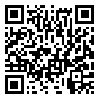Volume 6, Issue 2 (8-2020)
IJCA 2020, 6(2): 0-0 |
Back to browse issues page
Download citation:
BibTeX | RIS | EndNote | Medlars | ProCite | Reference Manager | RefWorks
Send citation to:



BibTeX | RIS | EndNote | Medlars | ProCite | Reference Manager | RefWorks
Send citation to:
Khamesan B, Vosoughi N, Zare S, Balasi J. Epidemiologic Study of G6PD deficiency in infants with Jaundice in Khalij-Fars Hospital of Bandar-Abbas in 2015. IJCA 2020; 6 (2)
URL: http://ijca.iums.ac.ir/article-1-174-en.html
URL: http://ijca.iums.ac.ir/article-1-174-en.html
Abstract: (2084 Views)
Background: The purpose of this study was to determine the prevalence of G6PD deficiency in infants with jaundice in Khalij-Fars Hospital of Bandar Abbas in 2015.
Methods: In this descriptive-analytic cross-sectional study, which is done in 2015 in Khalij-Fars Hospital of Bandar-Abbas, 226 infants with jaundice were entered. Admission age, hospitalization time, gender, age of birth, birth weight, type of delivery, as well as determining maternal and neonatal Rh type and blood group, G6PD status, hemoglobin, direct and total bilirubin, RBC, WBC, platelets, reticulocytes, hematocrit and direct coombs were analyzed. Finally, the information was analyzed in the SPSS V.22 using tests like Mann_whitney and Pearson correlation.
Results: The prevalence of G6PD in this study was 28.3% which is in boys 34.2% and in girls 21.7%. In terms of deficiency of G6PD in both sexes Significant differences were observed (P = 0.038). There was no significant relation between G6PD deficiency with type of delivery, admission age, admission time, total and direct bilirubin with infant's disease.
Conclusion: Due to high prevalence of enzyme deficiency and its association with neonatal jaundice and its complications, the need for a large screening program is felt. Also due to the possibility of hemolysis attacks at childhood because of drugs & favism in case of revealing enzyme deficiency in screening tests or jaundice, Warnings and adequate trainings in this field should be done.
Methods: In this descriptive-analytic cross-sectional study, which is done in 2015 in Khalij-Fars Hospital of Bandar-Abbas, 226 infants with jaundice were entered. Admission age, hospitalization time, gender, age of birth, birth weight, type of delivery, as well as determining maternal and neonatal Rh type and blood group, G6PD status, hemoglobin, direct and total bilirubin, RBC, WBC, platelets, reticulocytes, hematocrit and direct coombs were analyzed. Finally, the information was analyzed in the SPSS V.22 using tests like Mann_whitney and Pearson correlation.
Results: The prevalence of G6PD in this study was 28.3% which is in boys 34.2% and in girls 21.7%. In terms of deficiency of G6PD in both sexes Significant differences were observed (P = 0.038). There was no significant relation between G6PD deficiency with type of delivery, admission age, admission time, total and direct bilirubin with infant's disease.
Conclusion: Due to high prevalence of enzyme deficiency and its association with neonatal jaundice and its complications, the need for a large screening program is felt. Also due to the possibility of hemolysis attacks at childhood because of drugs & favism in case of revealing enzyme deficiency in screening tests or jaundice, Warnings and adequate trainings in this field should be done.
Type of Study: Original Research |
Subject:
Neonatology
Send email to the article author
| Rights and permissions | |
 |
This work is licensed under a Creative Commons Attribution-NonCommercial 4.0 International License. |


